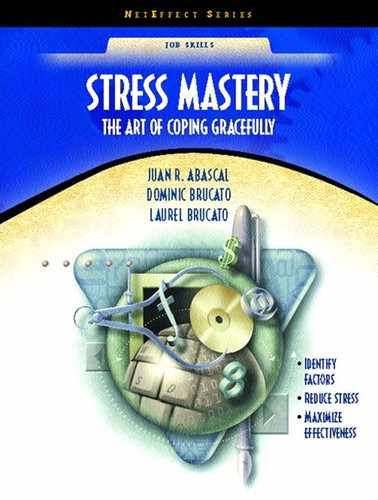Hardiness and Stress Resistance
Take a moment to fill out the Stress Hardiness Inventory. Research has documented an association between high hardiness scores and lower rates of physical illness among white-collar male executives and women in various occupations (Rhodewalt & Zone, 1989), blue-collar workers (Manning, Williams, & Wolfe, 1988), college students (Roth et al., 1989), and adolescents (Sheppard & Kashani, 1991). Hardiness is also associated with psychological health. Stress-hardy individuals report lower anxiety levels, less depression, greater job satisfaction, and lower levels of tension at work. In other studies, hardy subjects were shown to have stronger physical tolerance for stress. When exposed to a stressor they have a lower increase in diastolic blood pressure (Contrada, 1989) and a smaller increase in heart rate (Lawler & Schmied, 1987?).
One interesting study (Allred & Smith, 1989) demonstrated that male college students who scored low on hardiness experienced high levels of tension before the onset of a stressor (that is, as they waited and anticipated), while those scoring high on hardiness displayed higher arousal only during exposure to the stressor. It appeared that the hardy subjects got aroused only when they needed an adrenaline surge to confront the stressor more effectively, while the others spent valuable energy worrying. Hardy individuals do get physiologically aroused, but at the right time and to the right level.
Strong resistance to stress is associated with optimism, and clearly the ability to think positively is a defining characteristic of the stress-hardy. Stress-resistant people are more likely to use problem-focused coping measures, positive thinking, and support-seeking strategies when faced with stress (Cohen & Edwards, 1989; Holt, Fine, & Tollefson, 1987; Nowack, 1989). Those scoring low on measures of hardiness tend to respond passively to stress, whether with avoidance or maladaptive behaviors. Hardy individuals are much more likely to take care of their health, which helps boost their stress resistance. A strong sense of personal control over one's life is associated with better health habits, such as exercise and good nutrition. Stress-hardy individuals are far less likely to utilize maladaptive coping strategies such as abusing alcohol, drugs or nicotine, or to act out aggressively when under stress.
The Three C's in Action
In August 1992, we had an opportunity to witness firsthand how stress hardiness attitudes affected the ability of literally thousands of people to cope with a monumental crisis. Being based in South Florida (specifically, the southern portion of Miami) we, along with thousands of other people, experienced Hurricane Andrew, one of the strongest storms ever to ravage the mainland United States. The scale of property destruction and disruption of normal life for months afterward was unprecedented. Just about everyone in the hurricane zone (ourselves included) suffered severe damage to their homes, businesses, cars, and personal property. Rebuilding took years, and normal routines were totally disrupted for at least six months for most people. As psychologists we paid close attention to how individuals coped with the aftermath and we found that three distinct styles emerged:
The Adventurers— individuals who did not deny the reality of the damage but who focused on how interesting, how exciting, what an adventure it all was. These people relished rebuilding their homes with insurance money. They delighted in the sense of camaraderie and community that developed between neighbors who found themselves in the same boat, and who previously had barely spoken to one another.
Needless to say, the latter group experienced far fewer emotional disturbances and physical illnesses than the other two groups. They believed that they could control their destiny, even in the face of incredible ruin. They were committed to making the rebuilding process as joyful as possible. And they viewed the crisis as a challenge and an opportunity to recreate their living situation and make new friends. For them the hurricane became an epic, fascinating story to share with friends, rather than merely a tragic event.
Clearly, you should be able to perceive the wisdom in Stephen Covey's oft-quoted phrase, “The way you see the problem is the problem.” Ultimately, whether something is stressful depends on the way you look at the situation. Remember, it is not the world out there that makes you a victim, it is your perception of the circumstances and events that leads you either to be defeated by stress or to survive and thrive from the challenges and opportunities presented to you. You may not have control over all that happens to you, but you certainly always have control over the meaning you give to the events in your life. There is an old saying: “When God closes a door, he opens a window.” Remember this as you face apparent hardships in your life. Always look for the windows; we guarantee that they will be there, no matter what the circumstances.
